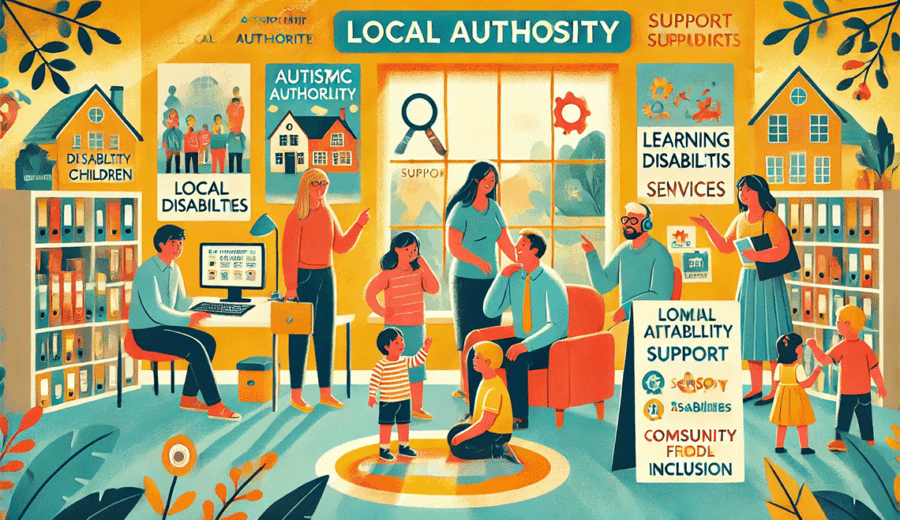
Local Authority Support for Families
Local Authority Support for Families of Autistic and Learning-Disabled Children
Local authorities in the UK play a crucial role in supporting families of children with autism and learning disabilities. They provide services designed to address educational, social, and health needs, helping children and their families navigate challenges and access essential resources. This article explores the various ways local authorities assist families and how to make the most of these services.
Understanding the Role of Local Authorities
Local authorities are responsible for assessing and meeting the needs of children with special educational needs and disabilities (SEND). Their duties include:
- Coordinating assessments and creating tailored support plans.
- Providing educational and social care services.
- Offering guidance on available resources and benefits.
Key Support Services Offered by Local Authorities
1. Education, Health, and Care Plans (EHCPs)
Local authorities manage the process of developing and reviewing EHCPs, which outline a child’s specific educational, health, and social care needs. These plans ensure children receive tailored support in school and beyond.
2. Early Intervention Services
Many local authorities provide early intervention programs, including developmental assessments, therapy referrals, and parenting workshops. These services are aimed at identifying and addressing challenges as early as possible.
3. Short Breaks and Respite Care
Short breaks offer parents a chance to rest while their children engage in structured activities. These breaks, organized by local authorities, provide enriching experiences for children while giving families time to recharge.
4. Specialist Education Support
Local authorities work with schools to ensure children receive the support they need, including:
- Special Educational Needs Coordinators (SENCOs) to manage accommodations in mainstream schools.
- Access to specialist schools for children with complex needs.
- Training for teachers on autism and learning disabilities.
5. Social Care Services
Social care teams assess the needs of families and provide support through:
- Assistance with daily living activities.
- Financial help for equipment or home adaptations.
- Connecting families with community groups and support networks.
6. Transition Planning
For young people aged 14 and above, local authorities help plan the transition to adulthood. This includes preparing for higher education, employment, and independent living.
How to Access Local Authority Support
1. Requesting an Assessment
Parents can contact their local authority to request an assessment for their child’s needs. This can be done directly or through a school or healthcare professional. The assessment will determine what support is required.
2. Applying for an EHCP
An EHCP request can be made if the child’s needs cannot be met through standard school resources. Parents should provide evidence, such as medical reports or school feedback, to support their application.
3. Utilizing the Local Offer
Every local authority provides a “Local Offer,” which details the services, activities, and support available for families of children with SEND. This can be accessed on the local authority’s website.
4. Engaging With Key Professionals
- SENCOs in schools act as the primary liaison for educational needs.
- Social Workers support families with assessments and care plans.
- Caseworkers assist with EHCP applications and reviews.
Challenges Families May Face
1. Limited Awareness
Some families may not be aware of the full range of services offered by their local authority. Engaging with parent forums or advocacy groups can help fill this gap.
2. Delays in Assessments
Waiting times for assessments or EHCPs can be long. Parents can seek interim support from schools or charities while waiting.
3. Disagreements Over Support
If families feel the support provided is inadequate, they can appeal decisions through the Special Educational Needs and Disability (SEND) Tribunal.
Tips for Maximizing Local Authority Support
1. Stay Informed
Regularly check the Local Offer for updates on available services, events, and programs.
2. Keep Detailed Records
Document all communications, reports, and assessments to ensure clear and consistent discussions with local authorities.
3. Build a Support Network
Connect with other families, local parent forums, or advocacy organizations to share experiences and resources.
4. Advocate for Your Child
Be proactive in expressing your child’s needs and requesting appropriate accommodations or services.
Resources to Support Families
1. National Autistic Society (NAS)
Provides information on local authority processes and rights for families of autistic children.
2. Contact
A charity offering advice on navigating local authority services and securing support.
3. SENDIASS (Special Educational Needs and Disabilities Information, Advice, and Support Services)
Provides free, impartial advice on local authority services for SEND families.





Leave a Reply